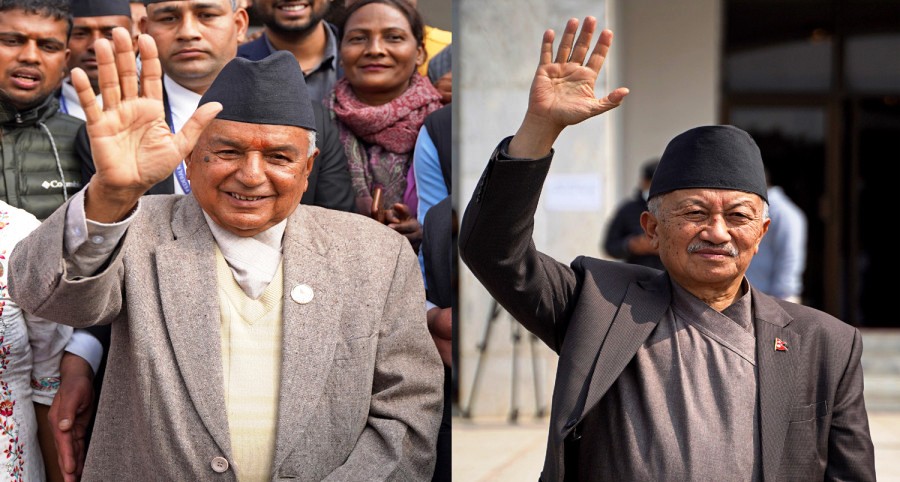Kathmandu (Nepal). Two former Speakers, who are also active politicians of the country’s two biggest electoral forces, filed their nominations on Saturday for the March 9 presidential election.
With the two previous Presidents courting controversy for trying to exercise ‘extra-constitutional’ powers, what the country really needs is a President who is broadly accepted, who can play a neutral role, and who can act as a true guardian of the constitution.
Supported by eight of the 12 parties represented in Parliament, Paudel seems to win the polls easily but Nembang also looks hopeful about his election. In Paudel’s corner are the Congress, the CPN (Unified Socialist), the CPN (Maoist Centre), the Nagarik Unmukti Party, the Janamat Party, the Janata Samajbadi Party, the Loktantrik Samajbadi Party, and the Rastriya Janamorcha.
From the UML, party’s vice-chair and chairman of both the Constituent Assemblies Subas Chandra Nembang has filed his candidacy.
Though Prime Minister Pushpa Kamal Dahal on Saturday claimed the eight-party coalition’s candidate, Paudel, won’t act against the spirit of the constitution, experts doubt it. Whether it is Paudel or Nembang who is finally elected, each being an active politician, he could look to work in the favour of his former party once elected.
Paudel, 78, who started his political career as a student leader at 14, could neither become the party President nor clinch the country’s top executive position in repeated attempts. He contested election against Sher Bahadur Deuba to become party president in 2016 and later he also challenged Deuba in the parliamentary party leader. But Deuba defeated him both times.
In 2011, as Congress’ parliamentary party leader, Paudel contested the prime ministerial election in the House. But he could not secure a majority even after 16 rounds of voting. In the 17th round, it was not him but UML’s Jhala Nath Khanal who secured the parliamentary majority to become prime minister.
Since the restoration of democracy in 1990, he has been elected as a member of Parliament six times (except in the 2017 polls) from Tanahun. He was elected Speaker after the 1994 midterm polls.
He became deputy prime minister and home minister, in addition to occupying other Cabinet portfolios like Local Development, Information and Communication and Peace and Reconstruction.
UML candidate Nembang, 70, joined politics while practising law. He was elected general secretary of the Nepal Bar Association in 1987.
He was elected member of the National Assembly in 1991 and in 1994, appointed the minister for law in the first UML-led government. In Paudel’s vein, Nembang has also been continuously winning polls from Ilam since 1999.
He became Speaker of the revived House of Representatives in 2006. A year later, he again became Speaker in the interim legislature. Nembang occupied the Speaker’s position four times in total, including twice as the CA chairman.

